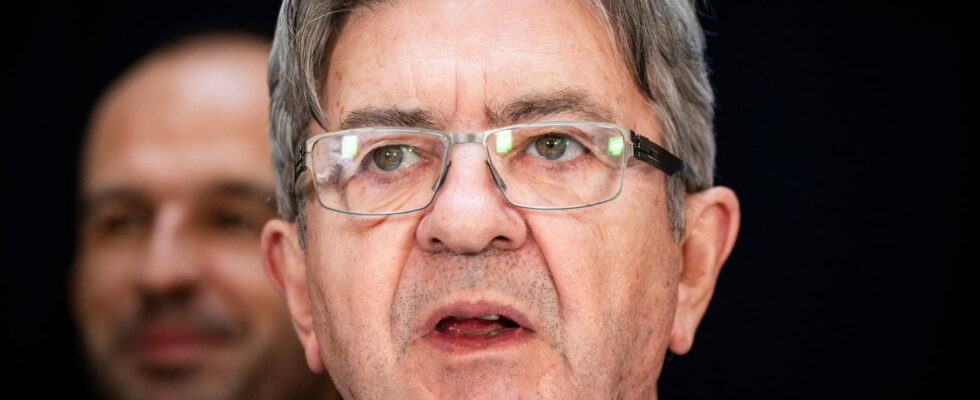In dire need of support even within the left, Jean-Luc Mélenchon’s divisive profile does not seem to embody the consensus needed to occupy the post of Prime Minister, which is supposed to “calm the country”.
After the New Popular Front obtained a relative majority in the National Assembly, the name of Jean-Luc Mélenchon was on everyone’s lips concerning the new occupant of Matignon. If the leader of LFI is not unanimous, even on the left, Mathilde Panot considered that he was “one of the possibilities” for Matignon. But the other figures of the New Popular Front are not of the same opinion. Fabien Roussel assured on RTL that the name of the leader of the rebels was “not even discussed”. And added: “For the majority of the representatives of the political forces in this New Popular Front, he will not and cannot be Prime Minister”. Clear, clean and precise.
Jean-Luc Mélenchon disowned by Marine Tondelier
Regarding Jean-Luc Mélenchon, Marine Tondelier’s assessment is also negative, as she expressed to our colleagues at RTL on Monday. The national secretary of EELV considered that “a good Prime Minister must calm the country” and “unite in his own camp”. The elected representative from the north then recalled that the rebellious leader “had said himself that he did not want to impose himself, and a whole section of the New Popular Front had said that they did not want it to be him”. Marine Tondelier hammered home the point: “For me, these answers were convergent: it was not going to be Jean-Luc Mélenchon”. Under these conditions, it is difficult to imagine Jean-Luc Mélenchon as a unifying candidate and a minimum of consensus to represent the alliance of the left.
Jean-Luc Mélenchon, on the other hand, benefits from unconditional support, that of his faithful ally, Manuel Bompard. According to the Coordinator of La France insoumise, Jean-Luc Mélenchon “has the assets to exercise this function. He is in line with the program that we defended during this election” declared the deputy of Bouches-du-Rhône this Tuesday on CNews. However, according to a CSA poll for CNews, Europe 1, and the JDD, Jean-Luc Mélenchon does not at all appear to be the favorite for the post of Prime Minister. When asked “who do you want as Prime Minister”, 16% of respondents answered Jordan Bardella, Gabriel Attal came in second (14%) ahead of François Ruffin (7%). Raphael Glucksmann (6%) and… Jean-Luc Mélenchon followed with 5% of the vote. If the triple candidate for the presidential election does not have unanimous support within the New Popular Front, he does not seem to convince the French either.
Emmanuel Macron will probably not appoint Jean-Luc Mélenchon as Prime Minister
The question will ultimately be decided by the head of state: it is up to Emmanuel Macron to appoint his Prime Minister. While it is customary for the President of the Republic to appoint a head of government from the majority bloc in the National Assembly, nothing obliges him to choose the personality designated by the bloc in question. Moreover, faced with a National Assembly made up of coalitions, none of which has an absolute majority, the President of the Republic has even freer hands to organize his executive: nothing actually obliges him to opt for a left-wing figure.
If Emmanuel Macron did indeed opt for a left-wing Prime Minister, he would probably choose a more moderate personality than Jean-Luc Mélenchon: a socialist, a communist or an environmentalist, or even someone who is not affiliated with a major party. He has already assured, before the second round of the legislative elections, that he would not govern with La France Insoumise. For a few days now, more consensual names such as the LFI dissident François Ruffin have been circulating. Marine Tondelier (EELV) and Olivier Faure (PS) are also in the running to enter Matignon, if the head of state were to choose a left-wing Prime Minister to govern.
Motion of censure: it is Parliament that decides
Under Article 8 of the French Constitution, the President of the Republic is the only person authorized to appoint the new Prime Minister. This is a discretionary choice by the Head of State, without any special conditions. In practice, logic dictates that the person chosen must gather sufficient parliamentary support to avoid a motion of censure. If a motion of censure is adopted by the majority of members of the National Assembly against this new Prime Minister, the government is overthrown. As a reminder, a motion of censure must be signed by at least one tenth of the members of the hemicycle, otherwise it is not admissible, before being voted on by the majority of members of the National Assembly to be adopted.
